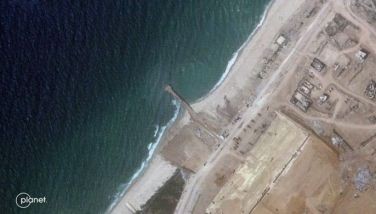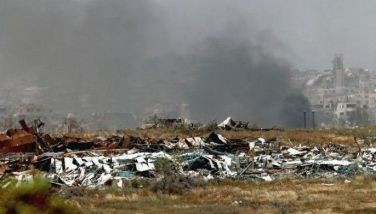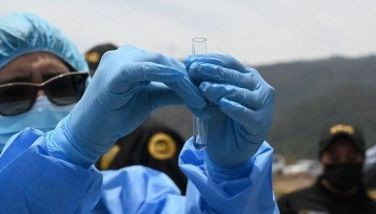Rights group: Syrian regime behind chemical attack
BEIRUT — An international human rights group said yesterday that evidence "strongly suggests" Syrian government forces fired rockets with warheads containing a nerve agent — most likely sarin — into a Damascus suburb in August, killing hundreds of people.
The report by Human Rights Watch was released as the international community weighs how to respond to the attack on the Damascus suburb of Ghouta, which the US, France and others also have blamed on President Bashar Assad's forces. The regime blames the rebels.
President Barack Obama had been lobbying for targeted military strikes against regime positions, but a Russian proposal to put Assad's chemical weapons arsenal under international control has raised hopes of a diplomatic breakthrough instead.
The US administration has insisted that there is very compelling evidence that the Syrian regime used chemical weapons against its own people, but it has not been presented to the public.
Human Rights Watch did not have direct access to the affected areas or the victims, but said its conclusions are based on witness accounts, the physical fragments of the weapons used and the symptoms exhibited by victims and documented by medical staff.
The New York-based group said it sought technical advice from an expert on the detection and effects of chemical warfare agents, and its experts studied documented medical symptoms of the victims and analyzed activist videos posted on the Internet after the attack.
"This evidence strongly suggests that Syrian government troops launched rockets carrying chemical warheads into the Damascus suburbs that terrible morning," said Peter Bouckaert, HRW's emergencies director.
Symptoms of the victims from the attack "provide telltale evidence about the weapon systems used," he added.
Three doctors who treated victims told HRW that the exhibited a range of symptoms, including convulsions, frothing at the mouth and dizziness — all of which are consistent with exposure to nerve agents such as sarin.
The most toxic of the chemical weapons, nerve agents affect the nervous system and are hazardous in their liquid and gas states. They can be delivered in missiles, bombs, rockets, artillery shells and other large munitions. The Syrian regime is believed to possess tabun, sarin and VX.
HRW added that evidence related to the type of rockets and launchers used in the attack "strongly suggests" that the weapon systems used are known and documented to be only in the possession of Syrian forces.
The Obama administration also has said that its intelligence indicate that sarin was used in the Aug. 21 attack, which it claims killed at least 1,429 people, including more than 400 children. Other estimates of the death toll are much lower.
Syrian Foreign Minister Walid al-Moallem said yesterday that his government has accepted the proposal to place its chemical weapons under international control for dismantling in a bid to stave off US military action, while France proposed a UN resolution that would enforce the plan militarily if the government failed to follow through.
Russia, Syria's most powerful ally, is now working with Damascus to prepare a detailed plan of action that will be presented soon, Foreign Minister Sergey Lavrov said. Russia will then be ready to finalize the plan with UN Secretary-General Ban Ki-moon and the Organization for the Prohibition of Chemical Weapons.
Syria's main opposition bloc, the Syrian National Coalition, dismissed the proposal and urged the West to go ahead with a strike against Assad's regime. The SNC, which is the main political opposition umbrella group, has been cheering for international military action, hoping a blow would shift the bloody war of attrition between rebels and Assad's forces, with more than 100,000 dead in more than 2 ½ years of fighting.
In a statement yesterday, the coalition said Moscow's proposal "aims to procrastinate and will lead to more death and destruction of the Syrian people."
"A violation of international law should lead to an international retaliation that is proportional in size," the group said. "Crimes against humanity cannot be dropped by giving political concessions or by handing over the weapons used in these crimes."
- Latest
- Trending
































